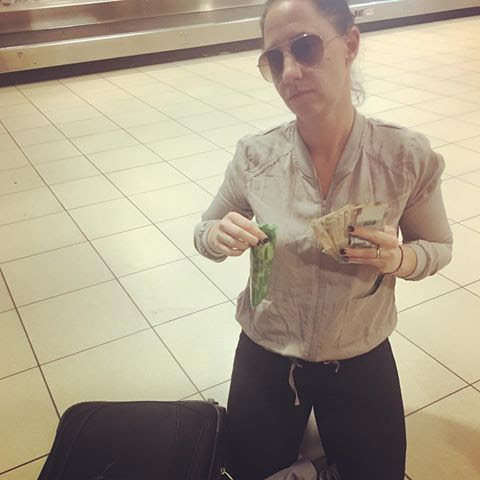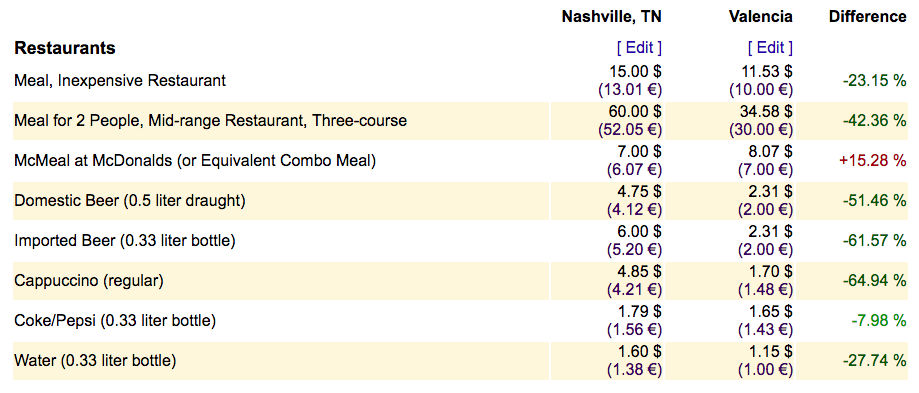The Cost of Living In Spain and Traveling Europe
I’m ‘baring all budgets’ in this post to let you know that if money is your biggest obstacle to moving or traveling extensively abroad – you’re about to get real pumped!!
Before we made our decision to move to Valencia, Spain my husband and I had to crunch the numbers and I tirelessly scoured for blogs and information about the cost of living in Europe. The problem is that everyone has a different idea of “cheap” and “expensive” as those are relative terms. I couldn’t find an answer to this that satisfied my need to know “how much will this cost?!!”

Your girl Escobar almost forgot to take her coca leaves (for altitude sickness) out of her bag at the airport in Peru! #lockedupabroad
In order to make this blog post purposeful and informative, I’m just giving you the actual numbers. How can you make a life decision without knowing the costs?
This is a transparent look into our finances but I’m so passionate about sharing it and documenting it for 3 important reasons:
1. I showed this spreadsheet to my kids (ages 7 and 9) so that they can understand what life costs. It brought about really great questions and important learning for them.
2. Our priorities as a family are to do things together and those travels and adventures cost money. If we want to go out to dinner, a movie, and buy popcorn – we can’t ALSO go on vacations. Now the kids have some ownership over our money-making decisions and are learning to prioritize with us. See here how they chose to address Christmas gifts this year:)
3. You can do the things you want to do in life if you prioritize them. Our apartment is small but in the heart of the charming old town (cue House Hunters Voice over chick), we don’t fill it with stuff, and we walk everywhere.
So without further ado. Here’s the cost of our life in Spring Hill, Tennessee – where cars and square feet abound:
TENNESSEE
$2000 House (4 bed/2.5 bath)
$900 2 Cars
$ 360 Health Insurance
$135 Car Insurance
$100 Boxing Membership
$135 Burn Workout Membership
$300 Gas for Cars
$230 2 Cell Phones
$60 Internet
$60 Electric
$60 Gas Bill
$40 YouTube TV TOTAL: $4,380
VALENCIA, SPAIN
$110 US Phones (we kept these for business purposes)
$1100 Apartment (2 bed/1 bath)
$50 Internet
$50 Soccer Team
$330 Health Insurance
$175 Bank: “Managed Treasury” in Nashville (The bank receives and deposits our US checks)
$15 Sabadell Spanish Bank Account
$25 2 Cell Phones
$80 Electric
$22 Gas
$ 240 Language Class (2 people 3 hrs/week) TOTAL: $2,197
So – how’s my dirty laundry smell?
Now you fully understand “how we afford that”.
As you can see, our European dream is LITERALLY half the cost of our Tennessee life. I promise you that I didn’t make these numbers up to come to this. Of course we had start up costs like buying bikes and locks, new bedding, the visa applications (see visa costs here), realtor fees, and the plane tickets to get here. But these start-up costs will balance out as we save money over the next months.
I have not included food in this breakdown. Some people eat out a lot and others cook at home. I left this off as each family is different and this cost is a variant that you can calculate for yourself using a really clever site called Numbeo. This site allows you to compare the cost of living in cities all over the world. Numbeo has prices broken down into categories like common grocery items, healthcare, transportation, and gives price comparisons on everything from domestic beers to McDonalds meals. They also take a look at crime, traffic, and quality of life. Here’s a Numbeo screenshot comparing Valencia, Spain and Nashville, Tennessee.

A reminder that if you choose private schools, most are located in the suburbs and require transportation. That is a budget game changer. We chose public schools – read what’s best for you in my blog on the subject here.
We wanted 3 things out of this move: For the kids to speak Spanish, to travel and bond as a family, and to have a better work/life balance. Our monthly budget reflects those priorities.
For some of my former high school students reading this (over 1,300 of you!): I hope that you write out your monthly spending then write out your life priorities/goals. Compare lists. Make adjustments. I think that most adults will tell you it took them too long to do this and if you can do it early on in life – you’ll be more fulfilled.
If you have any questions – reach out. I hope your family budget reflects what’s most important to you. It’s never to late to start! $uerte amigo$…



Budgets are a great thing at any age, and especially important for kids to start understanding this early. Appreciate the breakdown and transparency, amiga!
Señora!!! I love this!!! Thank you for sharing!! I love that y’all shared this with your kids to make a decision as a family… is that something y’all have always done? What ages-ish did it start? I know you’re also a fashionista..how are you balancing that?
Again…totally love this!
Mel – Thanks for reading. The fashionista thing is a bit easier here. My closet space is really limited AND I think “this shirt or that vacay?” and it’s always the latter. I LOVE Acorns – it’s an app that rounds up your spending and saves for you but you hardly feel it. Check it out and maybe use that as your clothes money. If there’s no money in there – you don’t need it, ha. XO
We’ve always shared $ talks with the kids at early ages. It’s a big part of life and I want them to have the words to navigate it and the ability to money in a healthy way: lots of communication, transparency, and honesty and a bit of good ‘ole fashion hard work:)
Kate,
This is super helpful information in our planning. Thanks for your insights and transparency. We’ve always been amazed by how cheaply we live when we’re in Spain. Some good meat, fresh veggies and lots of good Spanish wine (and coffee, of course) are all we need.
Do you find that the later Spanish work/life style makes it easier to support your US business needs? I’ve always envisioned having Spanish mornings to ourselves for family time and then kicking up the workday around noon, skipping siesta and wrapping up in time for a Spanish dinner.
Scott –
Thanks for reading. I find that with little kids the Spanish schedule poses challenges. Starting dinner at 8:30 or 9:30 is when I want the kids in bed! For that reason we eat at home a lot. The schedule you mention would work perfect for support US business though!